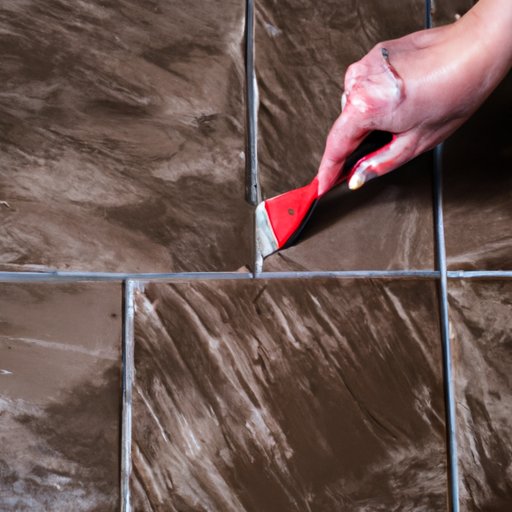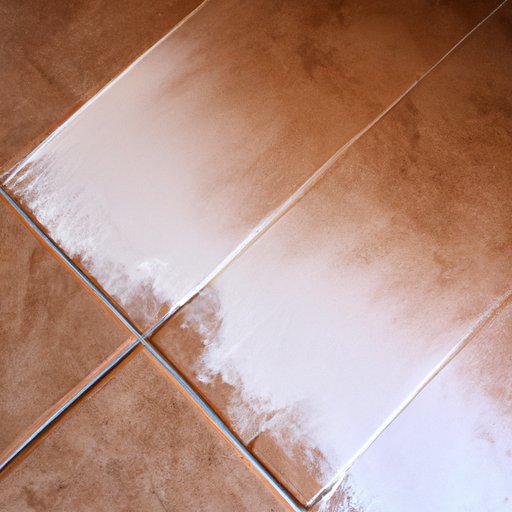
Introduction
Tile floors can be found in just about every household. Although they are durable and long-lasting, tile floors can become outdated or damaged over time. Homeowners may be left with the question of whether to replace their tile floors or give them a new look with some fresh paint. In this article, we will explore the pros and cons of painting tile floors, provide a DIY guide, offer creative ideas for painted tile floor designs, and highlight the unexpected benefits of painting tile floors.
The Pros and Cons of Painting Tile Floors: A Comprehensive Guide
Before deciding to paint your tile floors, it is important to consider the advantages and disadvantages that come with this choice.
Advantages of painting tile floors
One advantage of painting tile floors is affordability. Painting floors is a less expensive alternative to tile replacement, and it still provides a fresh, new look.
Another advantage of painting tile floors is the increased design options available. With paint, homeowners can choose to create unique patterns, texture or choose an exciting color for their floors.
Lastly, painting tile floors removes the need for complete replacement, creating a sustainable and eco-friendly solution.
Disadvantages of painting tile floors
One disadvantage of painted floors is durability. While it offers a new look, the paint does not change the physical make-up of the tile. It can easily scratch and chip over time, especially in high-traffic areas.
Another disadvantage is the time-consuming preparation phase that comes with painting a floor. It is essential to follow the correct steps for the paint to adhere correctly. Preparing the floor can take more time than the actual painting process.
Lastly, painting tile floors require specific paints that are meant for the surface. This can make it challenging to find the right products and techniques to achieve the desired results.

DIY Guide: How to Paint Your Tile Floors Without Making a Mess
Preparation steps
Preparation is critical when painting a tile floor. Below are the necessary steps to ensure a successful outcome:
The first step is to clean the tile surfaces thoroughly. Use a solution of equal parts of water and vinegar to scrub the tiles, then rinse and allow them to dry completely. Once dry, use a fine-grit sandpaper sheet to scuff the surface of the tile to ensure the paint adheres properly.
Before starting the painting process, cover any existing tile grout with painter’s tape and any surrounding surfaces with plastic coverings.
Gather the necessary supplies. You will need a primer, paint suitable for the tile floor, a paintbrush, and a foam roller.
Step-by-step painting process
Once you have the necessary supplies, follow these steps in painting your tile floor:
First, apply a thin layer of primer. After waiting for the primer to dry completely, apply one layer of paint with a brush. After the first layer is complete, use the foam roller to apply the second and third layers of the paint, allowing each layer to dry before applying the next.
Aftercare for painted tile floors
Curing is an essential aftercare step for painted tile floors. Allow the paint to cure for a minimum of 24 hours before walking on it or repositioning moveable furniture.
When cleaning a painted tile floor, avoid using harsh chemicals that could damage the paint layer. Instead, use a mild floor cleaner with warm water, a soft brush, and a mop.
Unexpectedly Chic: How to Transform Your Home with Painted Tile Floors
Painting tile floors offers an endless supply of design options. Below are some ways to showcase a stylish painted tile floor:
One of the most popular options for painted tile floors is the use of geometric patterns. This effect is achieved by masking out sections of the tile and then applying a different paint color.
For a more subtle approach, try the ombré effect; choose two shades of the same color and create a gradient appearance by blending the colors together.
Lastly, stencil designs on painted tile floors create a one-of-a-kind look that is personalized to your liking.
Not only do painted tile floors provide more design options, but they also have additional advantages.
Flexibility in home design, personalizing your living space with unique artistic elements and increasing resale value are all beneficial aspects of painted tile floors.
5 Surprising Benefits of Painting Tile Floors
Painting tile floors also comes with benefits that some homeowners might not be aware of.
A painted tile floor creates a non-slip surface that increases safety in the home. It improves the quality of air in the house as it has zero VOCs and can enhance natural light reflection in the interior.
Customization of tile floors for any design style is possible with painted tile floors, and it can make a small area appear bigger.
Before You Tile, Try Paint: A Budget-Friendly Alternative for Flooring
Painting tile floors offers a cost-efficient alternative to tile replacement. The cost of repainting a floor is generally more affordable than buying new tiles and having them installed by professionals.
When homeowners replace tiles, they often incur additional expenses such as labor costs, disposal fees, and increase in material expenditures that may not be included in the initial cost of purchasing new tiles.
Not only does repainting your tile floor save you money, but it can significantly increase the resale value of your home making it a wise investment for the future.
Color Your World: Creative Ideas for Painting Your Tile Floors
An advantage of painted tile floors is the opportunity to get creative with design options. Below are some creative ideas for painting your tile floor:
Use multiple colors to brighten up your room, such as a white base with a yellow and green pattern overlay.
Textured paint can offer a unique finish that transforms a blank floor into a masterpiece.
Instead of covering the tile with paint completely, add accents to the exterior while keeping the tile’s original pattern visible.
When choosing a color, coordination with the wall color is key. If floor’s color is neutral, opt for bold wall colors that offer a pop of color to liven up space.
Crisp and Clean: How White Painted Tile Floors Can Brighten Up Your Space
One of the easiest ways to transform your living space is by painting tile floors white. Below are some advantages and maintenance tips:
The use of white paint brightens up a room and complements any color scheme. When using white, the space appears more extensive and open, adding an intricate layer to your interior aesthetic.
To ensure that white painted tile floors remain clean and bright, dust and damp mop them regularly. Acidic cleaners or harsh chemicals may damage the paint layer, so it is advisable to only use mild floor cleaners.
Conclusion
Reinforcing the idea that painting tile floors is a budget-friendly alternative to complete floor replacement, this article offers a comprehensive guide and tips on how to transform your tile floor creatively. With fun and unique flooring design techniques, and durability advantages, the potential design options are endless. This article ultimately encourages homeowners to consider repainting their tile floors, resulting in a more contemporary, personalized living space.




